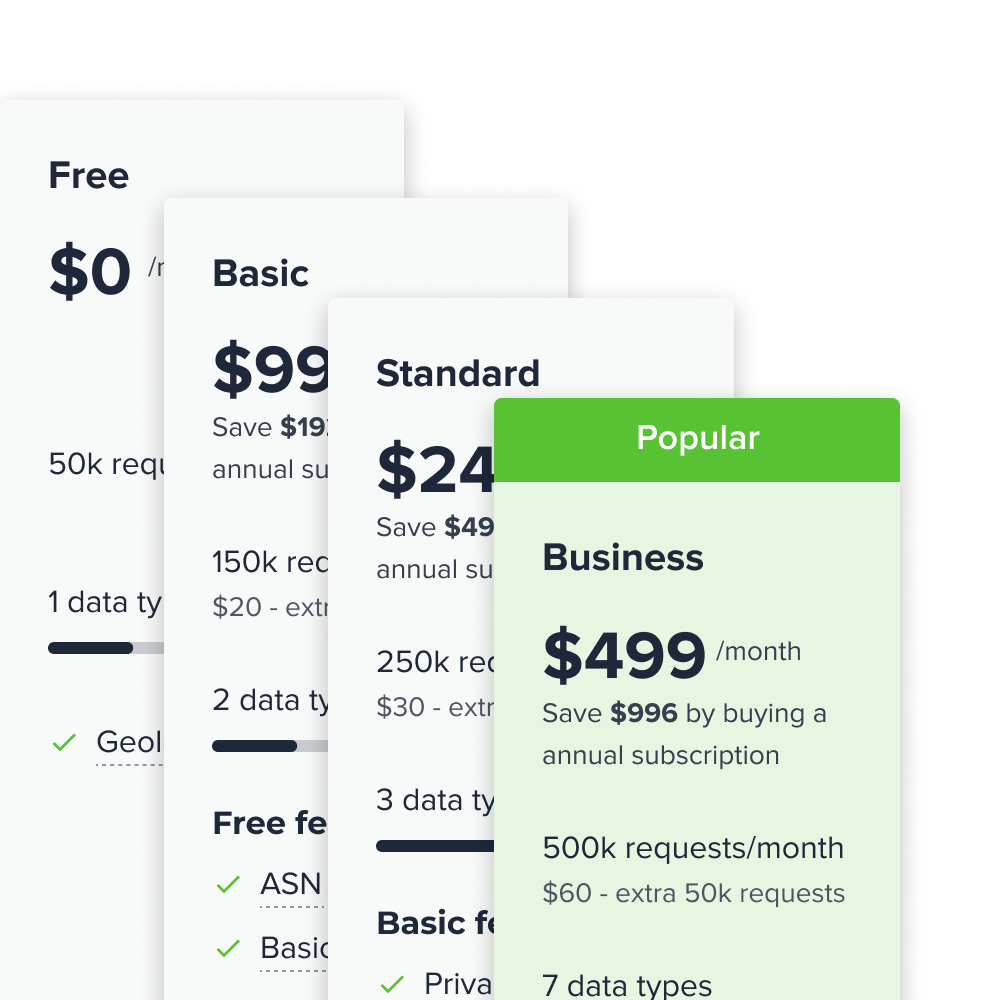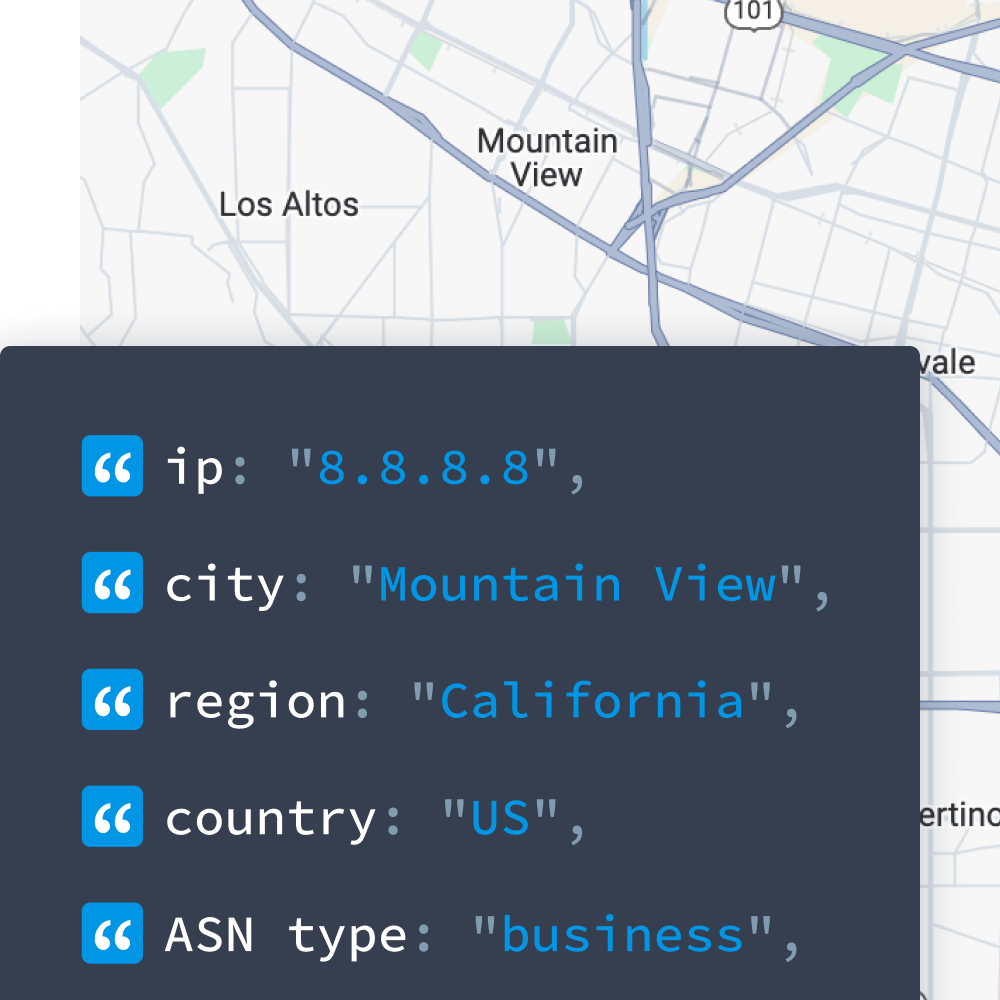 My IP ↗or
My IP ↗orFor anyone who’s ever tried to decipher pricing for geolocation services, it can be a monumental task. Some providers are free. Others charge per request. Still others hide their prices until you’re ready to talk to a sales representative.
Simply narrowing down how much to pay for geolocation data can be an overwhelming undertaking. Not only do decision makers need to weigh the priorities informed by developers and other team members, but they also have to consider all the services offered by that particular geolocation provider. Learn more about information gathered from an IP address.
Needless to say, it's not always easy for companies to narrow down their options. That’s why we’re giving you a few benchmarks to consider as you look at your budget and the prices of geolocation services.
IP Pricing Overview
- Price for 100k queries per month for a basic plan that provides city-level geolocation data:
- IPinfo: $66
- IP2Location: $32
- Maxmind: $30
- Ip-api: $15
- IPgeolocation.io: $6.50
- AbstractAPI: $2.88
- Digital Element: not listed
IP data pricing ranges from $0 per month for non-commercial purposes to hundreds to thousands of dollars per month for business or enterprise level users. A basic plan from the majority of IP geolocation providers is typically priced between a few dollars a month and $99 a month.
Most IP geolocation providers charge monthly or annual subscription fees that take into account factors such as:
- Data types needed
- Number of requests per month
- Specificity of geolocation data (country, city, zip code, etc.)
- Desired level of onboarding and customer support
- License type
These factors might not always be stated explicitly, so they’re important to have in mind when comparing costs—while some IP geolocation providers’ costs might initially appear higher, they might also include more features than competitors. Compare IP geolocation APIs.
Is Pricing the Most Important IP Feature?
Geolocation services offer many features, and price is one of them. Just like buying a house based on one feature, such as the generous size of the upstairs bathtub, might lead to some unexpected repercussions for homebuyers, choosing a geolocation provider simply based on one feature (such as price) may steer buyers away from their long term goals.
So should price be a major consideration? Yes, it absolutely should be. That being said, it’s easier to make good decisions when viewing price as a feature, rather than the ruling principle. Price is just one of several important factors to consider when choosing a geolocation services provider.
IP data is only as valuable as it is usable. IP address data that returns the most value is backed by data providers who monitor data streams, eliminate unreliable data sources, update databases regularly, and make IP data easy to use.
IPinfo’s Pricing
Because we want every potential customer to make informed, hassle-free decisions about their budget, at IPinfo we operate on an open pricing model. Users can sign up for free—no gimmicks or credit card information required. At IPinfo, we also believe in pricing transparency and flexibility, ensuring businesses can access the IP data they need without paying for other information they won’t use.
Our pricing tiers are designed to accommodate most use cases, from small startups to enterprise-level organizations. Our APIs scale seamlessly to accommodate growing businesses, ensuring continued performance. Beyond our standard plans, we excel at creating tailored solutions to meet unique requirements. Our team is used to building customized plans to accommodate high-volume requests, custom API responses, additional data fields, and more.
Our current 2024 pricing is:
- Basic Plan: $99/month for 150,000 requests
- Standard Plan: $208/month for 250,000 requests
- Business Plan: $416/month for 500,000 requests
- Enterprise Plan: Custom pricing for unlimited requests and advanced features
Check out IPinfo’s pricing options
Get the right IP option for your business, at a price that you can afford
Expected IP Pricing Range
Deciphering geolocation pricing models may be right up there with decrypting the Rosetta Stone. It’s confusing.
Pricing Models
By way of illustration, there’s at least one geolocation provider that offers their IP to Country database for around $50 per year for a single server. That is, unless you need a site license, at which point you’ll pay nearly a thousand dollars annually.
Another IP address service lists their prices publicly for a few products and then hides them for others. To complicate matters even more, customers will pay even more if they need other specific data beyond the baseline feature price.
And then there are other publicly available APIs that are completely free. But dig in a little further and you might notice the underbelly of free geolocation data that isn’t properly maintained, leading to inaccurate IP information, which can lead to more problems than it solves.
All this to say, the range of geolocation data price points range from absolutely nothing to very expensive.
Free Plans
IPinfo is unique in that our geolocation API is free up to 50,000 requests per month. While many other IP address providers offer some sort of free geolocation information, there are normally limitations such as these:
- Access to a database only, but not to a fully-functional API
- Less than 50,000 requests per month
- Free version offers lower quality data
- Database isn’t well maintained
- Poor or delayed customer support
In contrast to most providers, IPinfo’s free plan offers full API access with real-time data updates—delivering the same high-quality, reliable data as our paid tiers. This enables businesses to try our product while gaining valuable insights from accurate and up-to-date IP data.
Our customer support is fully available, responding to questions and requests on the same day, regardless of what plan you’re using. In other words, we welcome you to test our data at no risk to you.
Discover location-based data instantly
IPinfo’s IP address geolocation API is the quickest and most reliable solution for accessing geolocation context
Additional Factors to Consider (Other Than Pricing)
For paid plans, there are a variety of factors that influence what price to consider. We’ll lay a few of those out in this section.
Accuracy
Where geolocation services get their data affects the accuracy of their database. And the accuracy of their database directly affects users’ outcomes and return on investment.
Unfortunately, geolocation providers don’t always highlight where they get their data. For instance, many IP address services simply download data from another outside source.
This information may or may not be updated regularly and often isn’t validated by the geolocation provider. Many free APIs function this way.
Other geolocation providers don’t update their databases enough to ensure that buyers receive accurate data. Some manage information quality once a week, while others may rarely improve their data sets.
Issues with data quality have huge ramifications. Especially in high-risk industries such as cybersecurity, healthcare, or fintech, businesses need to know that the quality of data they receive will help them mitigate risks and protect customers.
But beyond that, industries like ecommerce, gametech, and adtech rely on accurate IP data to safeguard their online investments and maintain brand loyalty. Inaccurate data can lead to missed opportunities, lost revenue, and diminished customer trust. On the other hand, accurate data can drive measurable business success. For example, one adtech company saw a 1% to 3% profit increase and a 1% to 10% boost in CPA advertiser sales after integrating IPinfo’s data.
In IPinfo’s case, we source our own proprietary data using our Probe Network, and we update it every day. We are the benchmark for data accuracy in the IP data industry. Our in-house data experts closely monitor the information we provide so that customers can rely on the information they receive.
Learn more about our IP database management.
Flexibility
For future-oriented companies, flexibility is an important facet to look for in geolocation providers. For businesses that want to scale growth and not be slowed down by an inflexible API, these are important considerations:
- Is this geolocation provider equipped to expand with our growth?
- Where is our company headed over the next year? Two years? Three years?
- Can this API morph alongside accelerated growth? Or will it slow us down?
- Will we have to find and implement a different geolocation service if we grow more than expected?
Choosing a completely free API or one of the less-expensive databases, in other words, may come back to bite forward-looking businesses—a flexible API is an important feature to weigh when you look at prices.
IPinfo has made future-proofing part of our business: we enable flexible access to our data via an enterprise-grade API, downloadable databases, or leading cloud platform integrations.
Latency
Many industries don’t have the luxury of waiting around for their API to serve them the data they need. For instance, gaming companies may lose buyer loyalty if their real-time experiences don’t actually function in real-time.
But beyond that, cybersecurity and ecommerce companies need IP address data quickly to stay ahead of fraud or spammers. In short, take a look at the latency of each geolocation provider. This could help you eliminate a few options even if their pricing looks appealing.
Access to IPinfo’s data can accommodate hundreds of thousands of requests per second, with an average 50 to 200 millisecond response time, and a 99.999% uptime.
Support
Another factor to look at is support and customer service. And while this may not regularly affect project managers or C-suite executives, it directly impacts developers. So here are some questions to weigh while looking at different pricing options:
- What kind of support will be available to our team?
- Will my developers have the resources they need to work efficiently?
- What libraries does this geolocation service offer?
- In the long run, will we spend less money developing our use case if we choose one provider over another?
To quote Benjamin Franklin, “time is money.” The more time developers have to spend chasing around answers, solutions, or jimmy-rigging API functions for your purposes, the more you may spend in the long run.
IPinfo values our users’ time and investments by providing 24/7 customer support and a robust online community for sharing feedback and use cases.
Company-Specific Geolocation IP Considerations
The crux of the issue is knowing what factors matter most for your particular business. These factors could include:
- Is your company ready for rapid growth?
- Do you need to stay ahead of fraud?
- Do you need better web personalization to improve customer experiences?
And the list goes on and on. Explore ways your business can use IP geolocation data to inspire other potential use cases.
Questionnaire: Choosing the Right IP Geolocation Provider
So to make this a little easier, here's a brief questionnaire you can use to decide what geolocation services might help your company the most. In fact, you might want to have different team members fill it out to gather more information about efficiency in their department.
1.What are the budget constraints?
2. What does our team hope to improve or change with geolocation data?
3. What features matter most to my team?
- Low cost
- Accuracy
- Flexibility
- Latency
- Support
4. What will save us the most time in the long run?
- Low cost
- Accuracy
- Flexibility
- Latency
- Support
5. What features will protect our bottom line in the future?
- Low cost
- Accuracy
- Flexibility
- Latency
- Support
6. Which geolocation providers offer the best service for each feature?
- Low cost: _________________________________________
- Accuracy: _________________________________________
- Flexibility: _________________________________________
- Latency: __________________________________________
- Support: __________________________________________
7. Based on all of these considerations, what are my top three geolocation service choices?
If you want to share this quiz with a colleague or fill it right in now, download the full checklist here.
Conclusion: Geolocation IP Pricing Structure
Different companies have different pricing structures that offer varying levels of data specificity, API requests, customer support, and more. We believe users deserve pricing transparency, which is why we clearly lay out the features of each of our data packages. We also believe in making best-in-class data available to everyone, providing a free package that empowers users to try our solutions at no risk.
We believe that the best way to approach IP costs is to start with what your values are as a company and what information you need to reach your long term goals. These considerations trump everything else (even opinions we may have here at IPinfo). By focusing on your unique business needs, you can choose a data provider that aligns with your objectives while ensuring you get the best ROI. The right IP data can not only fuel smarter decisions, but also open up new opportunities for growth and innovation.
IPinfo is a comprehensive IP address data and API provider with flexible pricing plans to meet your business needs. We handle billions of API requests per month, serving data like IP geolocation, ASN, VPN detection, IP abuse contact and more. Sign up for a free account or contact our data experts to learn more.
This blog was last updated on 12/19/2024: We regularly update our blog posts to ensure it reflects the most current information.
About the author

Meghan is the content strategist at IPinfo, where she develops and writes content for users to better understand the value of IP data and IPinfo products.


